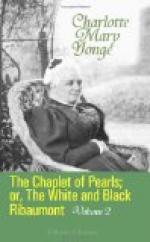Elisabeth was used to passiveness. She turned one inquiring look to her husband, but he looked sullen, and, evidently cowed by his mother, uttered not a word. She could only submit, and Catherine herself add that there was room for Madame de Sauve and Mademoiselle de Nid de Merle. Madame la Comtesse should follow! It was self-evident that propriety would not admit of the only demoiselle being left behind among the gentlemen. Poor Eustacie, she looked mutely round as if she hoped to escape! What was the other unkindness to this? And ever under the eyes of Diane too, who followed her to their chamber, when she went to prepare, so that she could not even leave a token for him where he would have been most certain to find it. Moments were few; but at the very last, while the queens were being handed in the carriage, she caught the eye of Philip Sidney. He saw the appealing look, and came near. She tried to laugh. ’Here is my gage, Monsieur Sidney,’ she said, and held out a rose-coloured knot of ribbon; then, as he came near enough, she whispered imploringly three of her few English words—
‘Give to HIM.’
‘I take the gage as it is meant,’ said Sidney, putting a knee to the ground, and kissing the trembling fingers, ere he handed her into the carriage. He smiled and waved his hand as he met her earnest eyes. One bow contained a scrap of paper pricked with needle-holes. Sidney would not have made out those pricks for the whole world, even had he been able to do more than hastily secure the token, before the unhappy King, with a paroxysm of violent interjections, demanded of him whether the Queen of England, woman though she were, ever were so beset, and never allowed a moment to herself; then, without giving time for an answer, he flung away to his cabinet, and might be heard pacing up and down there in a tempest of perplexity. He came forth only to order his horse, and desire M. de Sauve and a few grooms to be ready instantly to ride with him. His face was full of pitiable perplexity—the smallest obstacle was met with a savage oath; and he was evidently in all the misery of a weak yet passionate nature, struggling with impotent violence against a yoke that evidently mastered it.
He flung a word to his guests that he should return ere night, and they thus perceived that he did not intend their dismissal.
‘Poor youth,’ said Coligny, mildly, ’he will be another being when we have him in our camp with the King of Navarre for his companion.’
And then the Admiral repaired to his chamber to write one of his many fond letters to the young wife of his old age; while his son-in-law and Philip Sidney agreed to ride on, so as to met poor young Ribaumont, and prepare him for the blow that had befallen him personally, while they anxiously debated what this sudden descent of the Queen-mother might portend. Teligny was ready to believe in any evil intention on her part, but he thought himself certain of the




